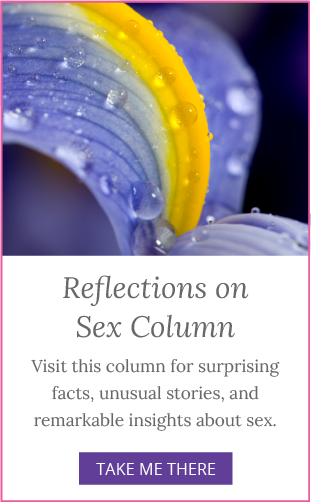When I worked as a sex therapist, clients used to ask me lots of challenging questions about sex. For example, they would ask: When is someone ready to have sex for the first time? How much sex is too much sex? Why do some people desire sexual contact more than others? I did my best to answer them directly, citing research and what I had gleaned through clinical experience.
Yet, whenever people asked, What’s the meaning of sex?, my mind would go blank and then I’d fumble for an answer. I felt like I was being asked: What’s the meaning of life?
A textbook answer might include something about sex being the fulfillment of natural biological drives for pleasure, procreation, and intimate relating. But I knew this was an inadequate response. Like life, sex is huge, varied, and ever-changing. During the course of our lives, we often experience sex as both good and bad, fulfilling as well as disappointing. Our society presents mixed messages about the meaning of sex—associating it with love, excitement, and health, as well as abuse, betrayal, and harm.
Our sense of sex – how we define and describe it – evolves over time as our bodies mature and our life circumstances change. Sex can mean a lot at one point in our lives, and very little at another. Profound experiences of sexual connection and pleasure often expand how we feel about it. Because sex means something different to us at different times, it’s difficult to nail down an answer. Worse yet, how can anyone answer what sex means for someone else?
When I did get it together to respond, I’d invariably turn the question back around, and ask my clients: What does sex mean to you? On reflection, I realize that was the best answer I could give. When we explore what sex means to us personally, the act of inquiring stimulates our own thinking. Contemplation can lead to powerful insights that enhance our sexual awareness, enjoyment, and appreciation.
Clients who explored what sex means to them would sometimes share important breakthroughs. A woman with infertility decided to expand her meaning of sex beyond procreation to give her sex life a new direction. A man who described himself as “addicted to sex” saw how his view of sex — as a drug and a way to feel powerful and medicate stress — was holding back his recovery and ability to experience sexual intimacy with a partner. Moving away from narrow, stagnant meanings of sex can help us move toward greater sexual health and happiness.
About ten years ago, when I was in my mid-60s, I had an experience that drove home how significant sex was to me. Unexpected genetic testing revealed that I carry the BRCA 2 gene that increases the risk of breast and ovarian cancer. My doctor said that with increased monitoring, I could safely keep my breasts, but she strongly suggested I have my ovaries removed.
Unlike many other cancers, ovarian cancer is difficult to detect until it has progressed to a life-threatening stage. When it came down to removing my ovaries versus the high possibility of getting a killer cancer, the choice was easy. I quickly agreed to the operation. As a sexuality expert, I knew in the back of my mind that this action would decrease my natural hormones and likely diminish my desire for and enjoyment of sex.
Several weeks later, as the attendants wheeled me into the operating room, I suddenly began to cry. Tears ran like rivers down my cheeks. My heart felt heavy and my breathing became rough. I hadn’t changed my mind about getting my ovaries removed. Instead, I became acutely aware of how much I valued my ovaries and, by extension, my sexuality. I “lost it” over not wanting to lose my sexuality.
I realized that for me, sex means everything wonderful about being alive. I associate sex with sensation, excitement, pleasure, fun, caring, discovery, creativity, intimacy, fulfillment, peace, and joy. Sex connects me with youthfulness, nature, and the universe. I adore how sexual relating creates a private language, that strengthens relationship bonds, heals wounds, and reaffirms love. I was afraid that without sex, my world would become bleak—all black and white, with no color.
Thankfully, my sexuality has endured sans ovaries. Sure, I experience changes in my drives and sensations. And my body continues to go through some subtle and not-so-subtle transformations. But to tell the truth, it’s hard to say how much relates to the surgery or other changes common and natural with aging.
Like many older adults, I’ve had to accept new sexual realities in myself and my partner. I’ve been learning to accommodate and make adjustments. Surprisingly, the meaning I continue to give sex – as aliveness, pleasure, and intimacy – helps me adapt to these changes. It invites me to think beyond specific body parts, behaviors, and functioning, and discover new ways to express sexual energy.
What does sex mean to you?
How has your concept of sex changed over time?
In what ways does the meaning you give sex help or hinder your happiness?
© Copyright Wendy Maltz, all rights reserved. First published on HealthySex.com August 22, 2023.



